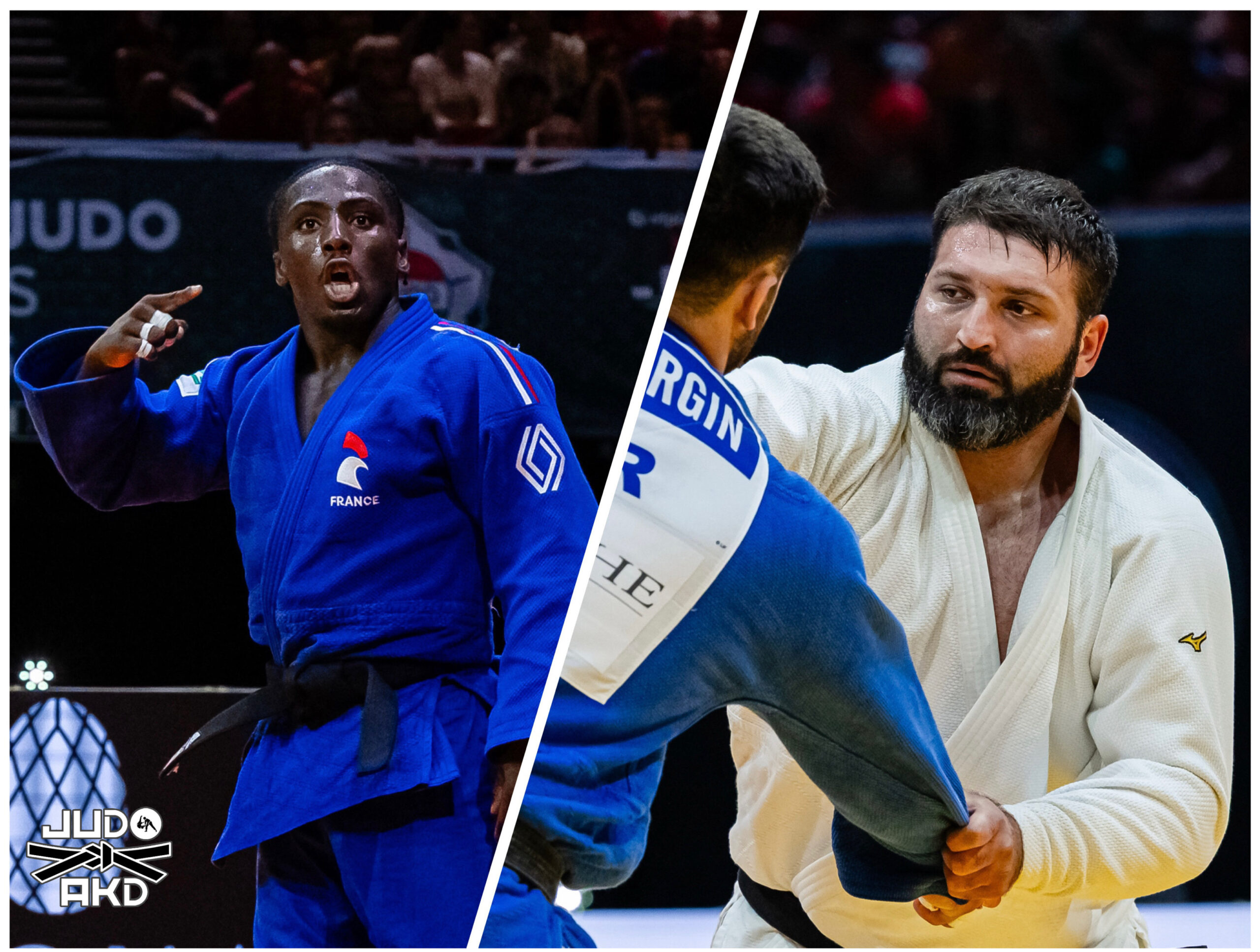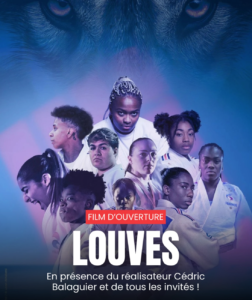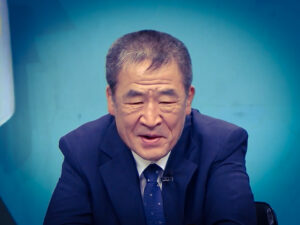In the bright days of 2025, Joan-Benjamin Gaba (U73kg) and Inal Tasoev (O100kg) achieved more than just becoming World champions in their respective categories. The two judokas took a risk by stepping outside the box in a way that was not obvious given the codes of the discipline that made them kings: the Frenchman released a rap song, and the Russian was the central character of a documentary of unprecedented depth. This departure from their comfort zones is part of a broader trajectory for both athletes. It is consistent with the titanium mental strength that both men have demonstrated in different ways in recent months.– JudoAKD#040
A French version of this article is available here.
On Friday, 15 August 2025, Rachid Laïreche’s remarkable interview with lyricist Oxmo Puccino was published in the French daily newspaper Libération. The interview saw the self-proclaimed « Black Jacques Brel » discuss his late return to his native Mali, offering the most profound reflection on this sensitive subject since MC Jean Gab’1 and Zoxea’s bittersweet track ‘Enfin’ or, on a very similar topic, Saul Williams’ blunt ‘African Student Movement’ and Khantrast’s caustic ‘Landed in Brooklyn’…. On the same day, Joan-Benjamin Gaba released ‘Kill Cam’. Two minutes and ten seconds of hushed ego-tripping, delivered almost without opening his mouth, with the sturdy serenity of those who have broad chests and a few heavy medals on the shelf. Two minutes and ten seconds is also the average time it took during the recent World Championships in Budapest for each of the Frenchman’s opponents to realize that the house opposite was barricaded with triple locks. And that his recent improvement was no fluke.
Let’s consider this release in the context of the long history of collaborations between athletes and the music industry, that footballers like Dutchman Memphis Depay or tennis players like Frenchman Corentin Moutet regularly titillate. Only time will tell if Gaba will follow in the footsteps of the hyperactive basketball player Shaquille O’Neal and release several albums during his career. One thing is certain: we’re a long way from Joël Bats here. The former goalkeeper of the successful French football team of the Platini era also found time to write ‘L’Escargot’ [‘The Snail], a children’s song firmly rooted in the synthetic sounds of the ’80s and the melancholic style of Renaud, Pierre Bachelet and Gérard Lenorman, who were at the top of the charts at the time. This is also a far cry from the schoolboyish ‘We’ve Got the Feeling’ by Chris Waddle and Basile Boli during their bromance days playing for Olympique de Marseille. Nor is it comparable to Yannick Noah’s post-career shift, as Gaba is « only » twenty-four years old. It is also not the personal indulgence of basketball player Tony Parker, who released an eponymous album alongside his career as a star point guard for the San Antonio Spurs. Finally, it’s not the ‘Polvere e Gloria’ campaign, a meticulously planned communication strategy by Italian tennis player Jannick Sinner. At the time of his return to the circuit in spring 2025, it combined excerpts from his speeches at formal ceremonies, AI-animated sepia photo albums, and the tenor voice of his compatriot Andrea Bocelli.
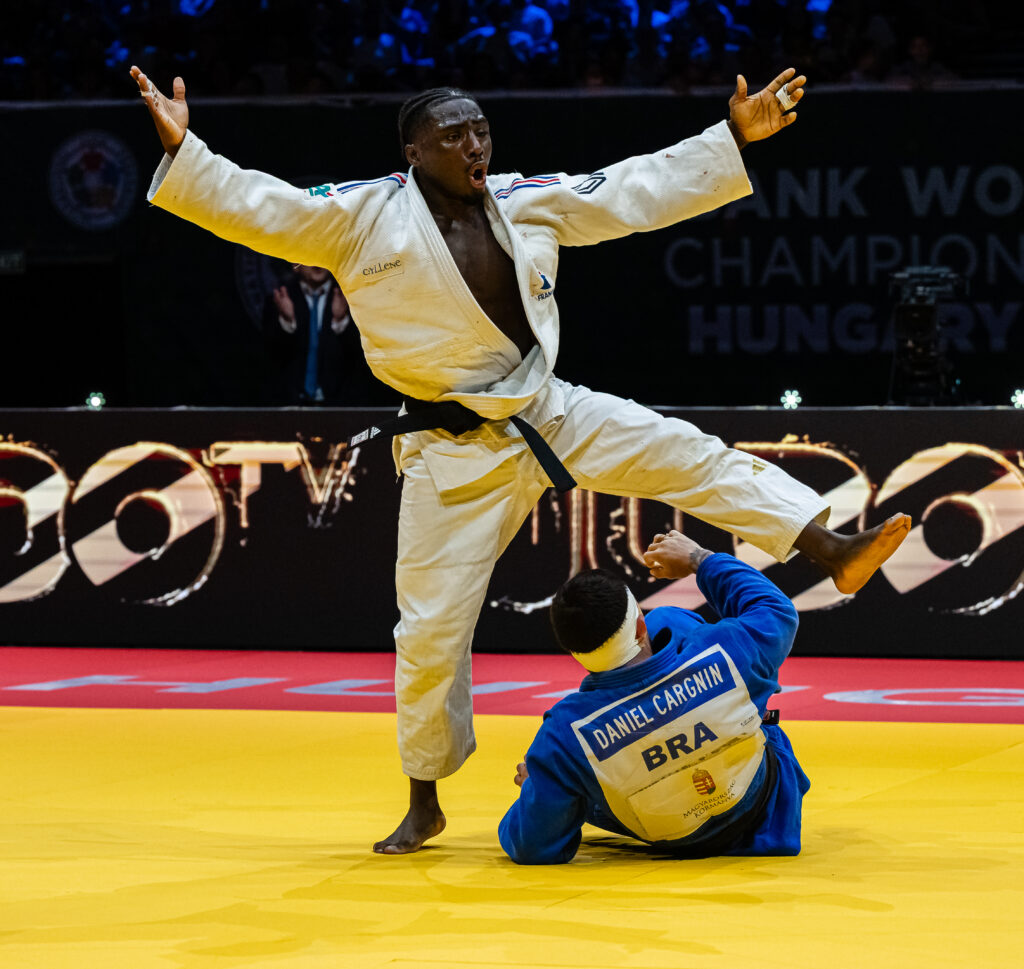
« I still remember back in zero-twenty-two/ When I didn’t have any money and couldn’t sleep/ Man, you know us; we’re not randoms/ I shoot real bullets — I’ve got the combo/ As long as I wet them, we’re not changing the line-up.. » [« J’me rappelle encore en zéro-vingt-deux/ L’absence de monnaie fallait pas que je m’endorme/ Igo tu nous connais on sera pas des randoms/ J’envoie des balles réelles, j’ai le combo/ Tant que je les wet on bouge pas la compo…« ] With a soft voice, technical placement and controlled flow, he spits out a new language understood by only a few happy people (‘wet’ basically means ‘beat’, he explains in a text message). Joan-Benjamin Gaba’s ‘Kill Cam’ is the happy sidestep of summer 2025, as Booba’s nod to ‘DKR’ was a few years ago (« Comme Audrey Tcheuméo j’suis médaillé » [‘Like Audrey Tcheuméo, I’m a medallist’]) or the virile escapades of French volleyball player Earvin Ngapeth, notably with our friend Lalcko (the man ‘whose eyes look like a bricklayer’s palm’ [« Mes yeux ressemblent à la paume de main d’un maçon« ]), the inspired author of the prolific ‘Lumumba’ and ‘Questions puissantes’, who one day silenced the competition with a definitive ‘We’re not the type to go up and down; we’re the type to get knocked down on the way up while trying to get there’ [« On n’est pas du genre à monter et descendre, plutôt du genre à se faire descendre sur la montée en essayant d’y arriver« ]).
Adorned with the unmissable Parental Advisory Explicit Content sticker and produced by Khandanz, who is clearly influenced by the soundscapes of Young Thug and Future, ‘Kill Cam’ follows in the continuity of the ties forged by the champion with the Sports division of the SPKTQLR (pronounced ‘spectacular’) label of the experienced Oumar Samaké, who is known for working with big names such as Lacrim, Dinos and Dosseh. The track confirms the appetite repeatedly expressed in interviews by the man who, alongside Maxime-Gaël Ngayap Hambou and Romain Valadier-Picard, is to date the finest ambassador for the Special Forces of French judo in this mode of expression. It is also a genuine discipline, unforgiving of the fearmongering of last-minute converts and nitpicky about the street credibility of those who claim to be part of it. Listening to this brief sample, which echoes the tangled rhymes of his contemporary Jolagreen23 or the Belgians Hamza and Green Montana, Joan-Benjamin Gaba has nothing to be ashamed of here either. He offers himself an outlet for sound and meaning amidst the formidable mental challenge of the confirmation season. Hammering home the point? That’s the plan. The track is short enough to suggest that this man of challenges, who has achieved the impossible in his discipline by winning every possible medal at continental, Olympic and world level in barely a year, will not stop there.
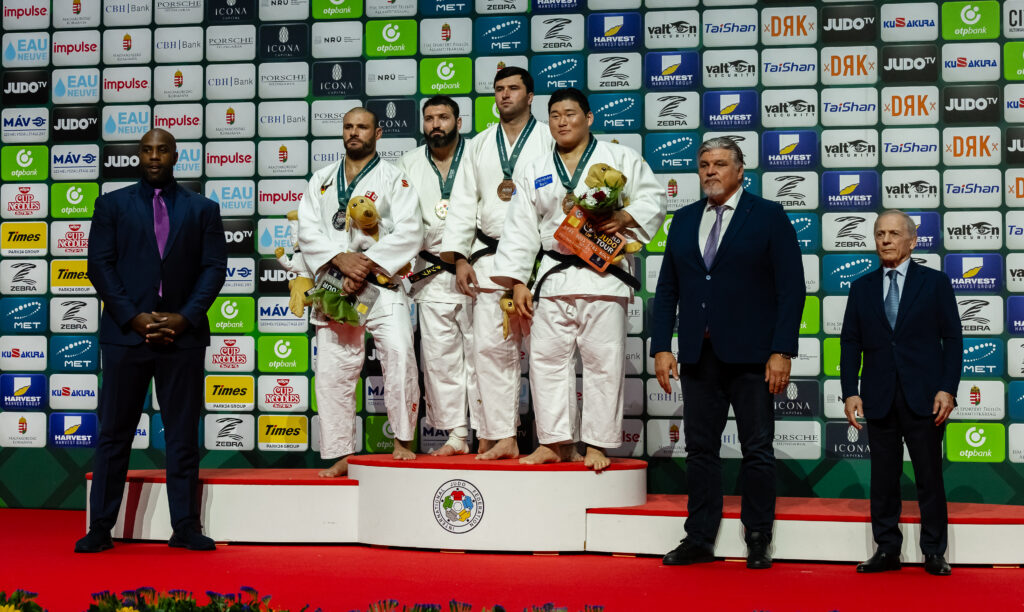
« In Europe and America, there’s a growing feeling of hysteria/ Conditioned to respond to all the threats/ In the rhetorical speeches of the Soviets… » In 1985, in the final stretch of a Cold War then on a knife’s edge, Sting’s song ‘Russians’, with its Sergei Prokofiev-inspired loop and polished black-and-white video by Jean-Baptiste Mondino, dismisses both sides equally – the diehards of the crescendo toward nuclear Apocalypse (« How can I save my little boy from Oppenheimer’s deadly toy?/ There is no monopoly on common sense/ On either side of the political fence »). Released in the same year as Elton John’s more theatrical ‘Nikita’, the song would have its rightful place in the charts four decades later, so much do historical cycles today seem to echo one another: ‘There’s no such thing as a winnable war/ It’s a lie we don’t believe anymore…’
This is not to detract from the seriousness of the Ukrainian issue, or the recent startling confidence by Vitalii Dubrova, their sporting director, that « twenty-two of the competitors at the European Cadet Championships in the Czech Republic in April were former Ukrainians who had been naturalised under other flags ». Rather, we took the time to watch a judo documentary that comes to us from the other side. Inal Valikoyevich Tasoev, the central subject of the film, has been the most consistent judoka in the O100kg category since the lockdown was lifted in October 2020, despite this category having no shortage of strong contenders. Alas, despite the unanimous respect of adversaries whom he throws as if they were willing participants, the child of Vladikavkaz (North Ossetia-Alania) has not yet been able to compete in the Olympic Games. This situation is consistent with the criteria dictated by the current international balance of power, but an aberration in sporting terms given the margin that his intuitive, action-reaction judo gives him over his opponents. By chance – or perhaps fate? – a few days before the documentary was released online, we sat down for an interview for the French weekly L’Équipe magazine. This took place in May 2025 in Benidorm, Spain, on the sidelines of the last major international gathering before the World Championships in Budapest, which Tasoev won a month later after another tough day.
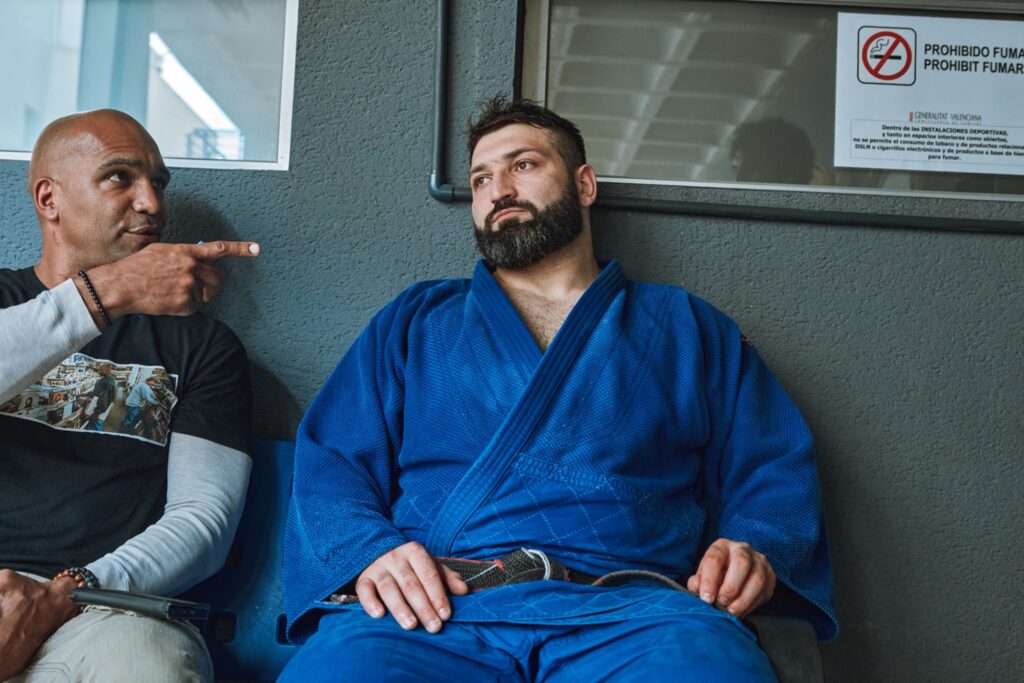
In St. Petersburg Vibes – A Story of Life, Sport and the Journey of a True Champion, director Georgy Kokoev and producer Alina Eloeva take the gamble of a documentary that doesn’t limit itself to judo on the tatami. The work resolutely changes scale, inscribing itself within a long memory and ancient civilizational roots. It takes interest in the soul of a club and a city (St. Petersburg, which was renamed Leningrad from 1924 to 1991), in mentors’ advice, in judo philosophy, and in the requirement to « remain true to oneself at every step of the path »… Of course, reading upon its publication the very well-documented Sportocracy in Russia: Governing through Sport in the Era of Vladimir Putin, 2000-2020 by Lukas Aubin (Béal editions, 2021) had reminded us, if need be and especially during a period of international tensions, that sport remains the ultimate soft power tool. But encounters, exchanges, and the personal requirement of the principle of symmetry in all things have also taught us that said soft power is not the prerogative of one latitude rather than another. Two plus two doesn’t always equal four in this matter, the margins for maneuver and expression granted must take into account many historical and cultural factors from one society to another, and the blinders as well as the vanishing points are numerous, sometimes referring us long afterward to what Swedish writer Sven Linqvist and Haitian filmmaker Raoul Peck painfully call « the sad certainties of ignorance. »
Unlike many sports documentaries, this is not only about alarm clocks, protein shakers, and parkas zipped from shins to collar before heading out hooded into the morning mist toward training, flip-flops and socks on feet, judogi on shoulder, AirPods in ears, and complicit fist-bumps with buddies upon arriving in the locker room – even though there are also these sequences, obviously. Here the camera rises. Takes height. Distance. Perspective. It enjoys the alliance between carp and rabbit between the placid and swaying Tasoev and the mischievous Anastasia Kosinets, the art historian tasked with making him discover the subtleties of ceilings, stained glass, tapestries, parquet floors, and other columns of marble, granite and gold of the opulent Hermitage of St. Petersburg, the former Winter Palace of the tsars that they explore together… It would have been easy for Tasoev to stick to his domain of expertise – the tatami. No shyness or complexes here though, as he blends into this landscape where he is by far the broadest-shouldered, even allowing himself to dare ask a question destined to make history about the existence of dinosaurs (!), or even to acknowledge with equally disarming candor his inability to hammer a nail or change a light bulb due to his total commitment to mastering his own art.
Judo remains the heart of the subject, between sessions of randori, weight training, stretching, and even ceremonial appearances at a traditional local tournament in honor of a USSR hero to present medals and transmit peace to some promising young judokas. It’s also about – is this really incompatible? – mysticism and spirituality. Of eternity, almost. A bit as if Terrence Malick, Albert Serra or Andreï Zvyaguintsev came to add their pensive touch to a prime time documentary. « Imagine all the nuances that people might miss » summarizes Tasoev, mouth agape before the majesty of certain details for which his eye as a « simple » judoka had not prepared him.
Taking these cultural wanderings as a pretext, St. Petersburg Vibes operates a back-and-forth between the history and geography of this continent-state, with the underlying shadow of the ephemeral (1917-1991) – but oh so pivotal – Soviet experience, and the soul of a champion in construction, shaped by as many certainties as gratitude toward the people as well as the trials encountered along the way. This chronicle of resilience gives measure to the ordinary life of a judoka who polishes his (martial) art to reach toward the extraordinary. A man on a mission, whose first twenty-seven years of earthly life already constitute a body of work, unwittingly echoing these lines drawn from Sculpting in Time by his compatriot, filmmaker Andreï Tarkovski (1932-1986): « The artist is a servant, eternally indebted for the gift he received as if by miracle. But contemporary man doesn’t want sacrifice, whereas it is the only true means of asserting oneself. He has forgotten this and consequently gradually loses the sense of his vocation as a human being. »
What strikes one in St. Petersburg Vibes is not the hagiographic side of the champion’s portrait – a classic of the exercise – nor the presentation of a postcard St. Petersburg. No, what strikes here is seeing how the two intertwine and intersect. The trajectories of an athlete and a city suddenly seem porous. « Water and stone are soothing », observes Mikhail Rakhlin facing an Inal Tasoev who tries to analyze the calm that inhabits him when he is in this mineral and aquatic city, of which he also feels « all the weight and sadness » – relating notably to the civilian and military hecatomb resulting from the 900 days of siege endured at the height of this Second World War that this corner of the globe calls the Great Patriotic War (these three bloody years were precisely the subject of the film Sergio Leone was working on when he passed away in 1989).
A partner in the documentary, Mikhail Rakhlin is the president of the St. Petersburg Judo Federation. He is the son of the feared Anatoly Rakhlin (1938-2013) – whose film dusts off an old notebook from the 1966-1967 season where the scrupulous handwritten notes of this child who himself returned from the siege of Leningrad contain, among other things, the competition results of a certain Vladimir « Volodia » Putin, fourteen years old and competing in the U52kg category at the time. He is also the younger brother of Evgeny Rakhlin, the man who on February 9, 2020 at the Paris Grand Slam refereed a famous Teddy Riner-Kokoro Kageura match, the Frenchman’s first defeat after nearly a decade of invincibility. He is above all the president of Turbostroitel, this club of the former Leningrad steelworks whose colors Inal Tasoev wears today like so many other glorious elders before him, from Latvian Aron Bogolyubov, the first Soviet judoka to win an Olympic medal in 1964 in Tokyo, to the gradual shift toward the Caucasian center of gravity ranging from the unsinkable Ossetian Madina Taimazova, survivor of extended golden scores in 2021 in the same Nippon Budokan, to « Armenian » Adam Adamian, the first – and only – judoka to date to have succeeded in dominating Czech Lukas Krpalek in the final of a world competition (in 2023 at the Doha World Championships), passing through Dagestani Tagir Khaybulaev and Ingush Khasan Khalmurzaev, Olympic champions respectively in London and Atlanta.
Between a tribute to Irbek Viktorovich Aylarov, Inal Tasoev’s lifelong coach, guardian of his inner security and the self-confidence that flows from it, and a reminder of the importance of letting children awaken through games before moving to more intensive training, Mikhail Rakhlin multiplies aphorisms. « Two things define us in this life: how we handle loss and how we handle defeat. Defeat makes us stronger. Loss makes us wiser. […] Inal missed the Olympics twice but he came back stronger. He continues to believe in his dream and he continues to believe in himself, in his passion and in his will to move forward. » Further on, he goes so far as to compare him to Ronaldo, the Brazilian footballer. Like the 1997 and 2002 Ballon d’Or winner, Inal Tasoev embodies according to him the rare combination of talent, mental and physical discipline, improvisation, and learning capacity. « One day, people will have to study him, ask psychologists what was going on in his head and write books about him. His mental resistance is exceptional. A champion is like a tightrope walker: there’s only one in a million who can advance on the rope without falling. Inal is of that caliber. » – Anthony Diao. Acknowledgments: Alina Eloeva, Theodoros Tselidis, Monalie Diao-Thomé. Opening photos: ©Paco Lozano. Editing: Thomas Eustratiou-Diao/JudoAKD.
A French version of this article is available here.
More articles in English:
-
- JudoAKD#001 – Loïc Pietri – Pardon His French
- JudoAKD#002 – Emmanuelle Payet – This Island Within Herself
- JudoAKD#003 – Laure-Cathy Valente – Lyon, Third Generation
- JudoAKD#004 – Back to Celje
- JudoAKD#005 – Kevin Cao – Where Silences Have the Floor
- JudoAKD#006 – Frédéric Lecanu – Voice on Way
- JudoAKD#008 – Annett Böhm – Life is Lives
- JudoAKD#009 – Abderahmane Diao – Infinity of Destinies
- JudoAKD#010 – Paco Lozano – Eye of the Fighters
- JudoAKD#011 – Hans Van Essen – Mister JudoInside
- JudoAKD#021 – Benjamin Axus – Still Standing
- JudoAKD#022 – Romain Valadier-Picard – The Fire Next Time
- JudoAKD#023 – Andreea Chitu – She Remembers
- JudoAKD#024 – Malin Wilson – Come. See. Conquer.
- JudoAKD#025 – Antoine Valois-Fortier – The Constant Gardener
- JudoAKD#026 – Amandine Buchard – Status and Liberty
- JudoAKD#027 – Norbert Littkopf (1944-2024), by Annett Boehm
- JudoAKD#028 – Raffaele Toniolo – Bardonecchia, with Family
- JudoAKD#029 – Riner, Krpalek, Tasoev – More than Three Men
- JudoAKD#030 – Christa Deguchi and Kyle Reyes – A Thin Red and White Line
- JudoAKD#031 – Jimmy Pedro – United State of Mind
- JudoAKD#032 – Christophe Massina – Twenty Years Later
- JudoAKD#033 – Teddy Riner/Valentin Houinato – Two Dojos, Two Moods
- JudoAKD#034 – Anne-Fatoumata M’Baïro – Of Time and a Lifetime
- JudoAKD#035 – Nigel Donohue – « Your Time is Your Greatest Asset »
- JudoAKD#036 – Ahcène Goudjil – In the Beginning was Teaching
- JudoAKD#037 – Toma Nikiforov – The Kalashnikiforov Years
- JudoAKD#038 – Catherine Beauchemin-Pinard – The Rank of Big Sister
- JudoAKD#039 – Vitalie Gligor – « The Road Takes the One Who Walks »
- JudoAKD#041 – Pierre Neyra – About a Corner of France and Judo as It Is Taught There
- JudoAKD#042 – Theódoros Tselídis – Between Greater Caucasus and Aegean Sea
- JudoAKD#043 – Kim Polling – This Girl Was on Fire
- JudoAKD#044 – Kevin Cao (II) – In the Footsteps of Adrien Thevenet
- JudoAKD#045 – Nigel Donohue (II) – About the Hajime-Matte Model
- JudoAKD#046 – A History of Violence(s)
- JudoAKD#047 – Jigoro Kano Couldn’t Have Said It Better
- JudoAKD#048 – Lee Chang-soo/Chang Su Li (1967-2026), by Oon Yeoh
Also in English:
- JudoAKDReplay#001 – Pawel Nastula – The Leftover (2017)
- JudoAKDReplay#002 – Gévrise Emane – Turn Lead into Bronze (2020)
- JudoAKDReplay#003 – Lukas Krpalek – The Best Years of a Life (2019)
- JudoAKDReplay#004 – How Did Ezio Become Gamba? (2015)
- JudoAKDReplay#005 – What’s up… Dimitri Dragin? (2016)
- JudoAKDReplay#006 – Travis Stevens – « People forget about medals, only fighters remain » (2016)
- JudoAKDReplay#007 – Sit and Talk with Tina Trstenjak and Clarisse Agbégnénou (2017)
- JudoAKDReplay#008 – A Summer with Marti Malloy (2014)
- JudoAKDReplay#009 – Hasta Luego María Celia Laborde (2015)
- JudoAKDReplay#010 – What’s Up… Dex Elmont? (2017)
And also :
- JudoAKDRoadToLA2028#01 – Episode 1/13 – Summer 2025
- JudoAKDRoadToLA2028#02 – Episode 2/13 – Autumn 2025
JudoAKD – Instagram – X (Twitter).

